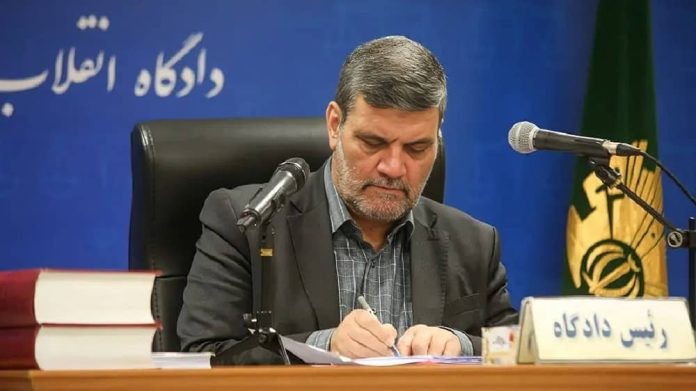Judge Salavati: The Ruthless Enforcer of Iran’s Medieval Legal Decrees

iran judicial judge abolqasem salavati (1)
Written by
Amir Taghati
Before dawn on January 23, the lives of two individuals came to a tragic end within the confines of Ghezel Hesar Prison. Mohammad Ghobadlou, a protester from the 2022 uprising, and Farhad Salimi, a Kurdish activist, faced the executioner’s wrath. Their death sentences were signed by Judge Salavati, the remorseless adjudicator of the Iranian regime.
Wielding the gavel of fate, Abolghassem Salavati, colloquially known as Judge Salavati, has etched his name in infamy through a dark legacy of concocted charges and draconian sentences. Termed as the “Judge of Execution” or simply “the Death Judge,” he revels in his role as the harbinger of death.
Judge Salavati’s notoriety extends beyond Iran’s borders, as he actively contributed to the sentencing of numerous American and Western citizens detained by the Iranian regime. Leveraging these individuals as pawns in a sinister hostage-taking agenda, he has imposed prolonged imprisonments and even death sentences upon them.
Facing sanctions from both the European Union and the United States in 2011 and 2019, respectively, Salavati stands accused of human rights abuses that have shocked the world.
His litany of human rights violations includes denying legal counsel to at least 229 defendants, placing a minimum of 166 individuals in solitary confinement, restricting contact between 104 defendants and their relatives, and subjecting 46 individuals to both mental and physical torture.
Judge Salavati proudly wears the moniker “Judge of Execution,” turning death sentences into a source of personal pride and familial boasting. His wife, Parvin Shiri, hailing from Kermanshah, faced her own battles, retiring from a nine-year stint in a mental health facility at the age of 40 due to psychological distress caused by the revelation of her husband’s gruesome judgments.
Environmental Activist Alleges Jail Torture for Forced Confessions
Niloufar Bayani, a detained environmental activist in #Iran, has said in a court sessions headed by judge Salavati that she has repeatedly been attacked&threatened by authorities&was forced to make confession. pic.twitter.com/QqIUo9oI35— NCRI-FAC (@iran_policy) February 5, 2019
Salavati’s journey began as a judge in Eslamabad-e-Gharb, Western Iran, before moving to Kermanshah. Residing temporarily in the confiscated residence of the affluent Hamedanian family, he was later transferred to Hamedan, earning a promotion for his unapologetic executions in Eslamabad-e-Gharb.
Notably, there is no record of Salavati possessing any legal education or qualifications, leaving human rights advocates and even fellow judges wary of his erratic judgments. His lack of understanding of legal principles further compounds the fears within his own circle.
Judge Salavati rose to prominence by overseeing public show trials of demonstrators following Iran’s contentious 2009 presidential election. Not only did grassroots protesters face his judgment, but so did former government officials such as Mohammad Ali Abtahi, Behzad Nabavi, and Abdollah Ramezanzadeh. Over a hundred demonstrators received lengthy prison sentences, with at least six condemned to death.
Some pivotal cases presided over by Salavati include the ominous trial of Iranian-Swedish doctor Ahmadreza Djalali, where the judge proclaimed, “Your sentence is death, and it won’t change at the end of the trial.”
In the Ruhollah Zam case, he handed down a death sentence on 17 charges, leading to Zam’s execution on December 12, 2020, despite being a French resident.
For decades the crimes of the Iranian regime have been met with impunity.
Condemnation of one of the perpetrators of #1988Massacre to life prison in a court of Stockholm is the first step. Raiisi &Khamenei and principal responsibles of genocide must be tried by justice pic.twitter.com/gqzq8lCGe1— Maryam Rajavi (@Maryam_Rajavi) July 15, 2022
In the trial of a group of environmental activists, Salavati denied defendants the right to choose their own lawyers. Narges Mohammadi faced a ten-year prison sentence in 2015, and Mohsen Amir-Aslani received the death penalty in October 2014 for providing a different interpretation of the Quran. Zahra Bahrami, an Iranian-Dutch citizen, initially arrested for participating in the Ashura protests in 2009, was executed on January 22, 2011, with her death sentence later attributed to drug trafficking to evade international scrutiny. Omid Kokabi, an elite physics student in the United States, received a ten-year prison sentence in April 2012 for allegedly “collaborating with an enemy state.”
In a regime that only survives and thrives on terror, individuals such as Judge Salavati find an unhindered path to power by betraying the very essence of humanity and humanitarian values. Despite global condemnation and rightful designation of the clerical regime for its egregious human rights violations, the lack of concrete actions has granted perpetrators like Salavati an alarming degree of impunity. The international community, at the very least, should advocate for the universal diplomatic isolation of Tehran, making any relations contingent upon the cessation of the death penalty in Iran.
Judge Salavati: The Ruthless Enforcer of Iran’s Medieval Legal Decrees

